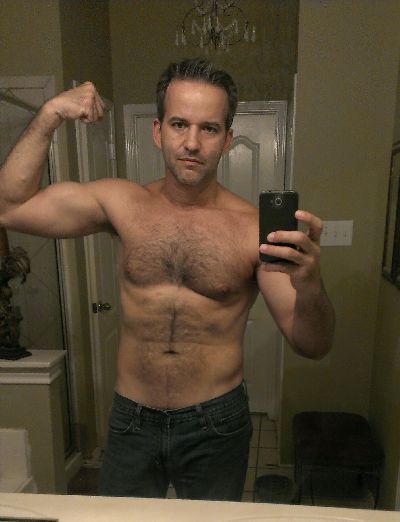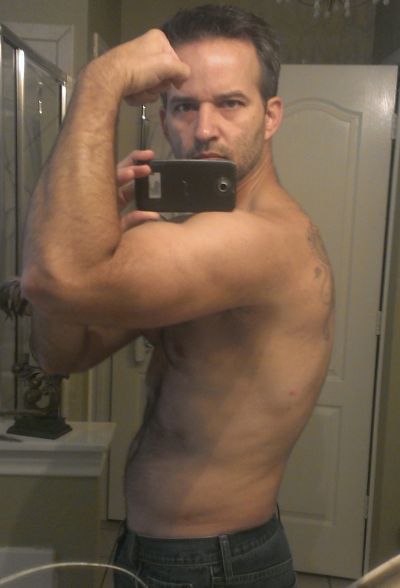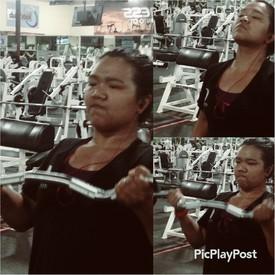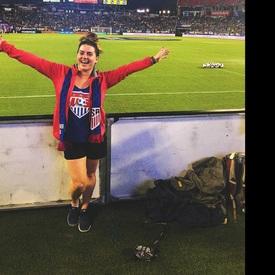We are pleased to announce that as of March 4, 2025, an updated Rich Text Editor has been introduced in the MyFitnessPal Community. To learn more about the changes, please click here. We look forward to sharing this new feature with you!
Working out on an empty stomach?
Replies
-
Ive been wondering the same thing. Sometimes I grab a banana before I go to work but other times I just drink water. But I start my work out every morning at 6:00am and finish at about 7:30am. I'm just not hungry that early in the morning. I do have a protein shake after my workout as recovery. But is it a bad thing to workout on an empty stomach?
Also I do have a pre-workout powder (C-4) that I use sometimes but still don't feel a difference.
You do not feel C4. I tried C4 once and I felt like I just had a adrenaline rush and I am ready to breaks some personal record.0 -
Well, opinions vary but I do 30 - 40 miles of fasted cardio a week. Judge for yourself if this produces good results. This isn't even my leanest weight. I'll drop 10 pounds off this by December. Yes, it will rip fat off your body IF you don't overeat. Calories in vs. calories out are the main concern. Everyone here is overthinking this.

It does not use up your muscle for food. It trains your body to use fat for energy for long endurance events. 0
0 -
I'll have what he's having.Well, opinions vary but I do 30 - 40 miles of fasted cardio a week. Judge for yourself if this produces good results. This isn't even my leanest weight. I'll drop 10 pounds off this by December. Yes, it will rip fat off your body IF you don't overeat. Calories in vs. calories out are the main concern. Everyone here is overthinking this.
It does not use up your muscle for food. It trains your body to use fat for energy for long endurance events. 0
0 -
Personally if I get up for a morning bike ride, which is roughly 8-10 miles depending on the route I choose, I like to do it before eating. However I do drink plenty of fluid before I got which often includes almond or coconut milk which helps with the energy I'm sure. I do my morning rides as quickly as possible.0
-
I'll have what he's having.
LOL.
When you eat food your body fills up your glycogen stores in your liver, then it fills up your muscle glycogen stores. Leftover energy gets converted to fat. Between your liver and your muscles you have enough energy for about 2 hours of intense exercise. Of course if you haven't' eaten all night long you'll have less and then your body will need to get extra energy from elsewhere. Your body does not prefer to burn muscle. It wants to use body fat. That's what it's there for.
So you workout, use up some body fat and then eat breakfast. Go back to step A where your liver and muscles start refilling. Repeat. The net result of your work still depends on hitting calorie goals and not overeating. Yes you're training your body to more easily use fat for energy working out fasted but if you're adding more gas to your car after it's full you're still going to pack on the weight.
I personally believe that aside from the endurance benefit that fasted cardio does provide a tiny advantage. It's very small but spread out over a year, week after week this little bit of difference adds up to makes a noticable difference.0 -
lol @ bowel of cereal.Suggestion also: Try using a heart rate monitor that shows your calories burned- do exactly the same workout two days in a row, the only variable to change would be do one after eating food before, and the other workout without food. Compare to see the difference! Post the results here. That would be interesting.
That won't do anything. It will produce the same result because of how HRMs work.0 -
I normally don't eat when i first get up, but i like to head out for my walk within a half hour or so of waking up. Some mornings, like this morning, i woke up starving so i had a zucchini apple raisin muffin (homemade yummy!) before I left. So for me, it just depends on how i feel. If I'm hungry, i make sure to eat because I'll feel sick and lightheaded before I'm done. No need for that!0
-
In to read more later.0
-
If I didn't do my work out as soon as I got up, I don't think I would get it done at all!! I tend to have my breakfast afterwards
I'm similar to this.0 -
I always run in the mornings on an empty stomach. After reading the MFP blog yesterday, I decided to eat oatmeal this morning to see if it made a difference. It didn't. If anything, it made me feel somewhat sluggish. I'll stick to running on an empty stomach because that's what works for me.0
-
These articles are not peer reviewed studies and do not do a good job of presenting research on the subject.
The best answer I think is to find what works best for you and do that.0 -
These articles are not peer reviewed studies and do not do a good job of presenting research on the subject.
The best answer I think is to find what works best for you and do that.
I used to try HIIT on a empty. You know what happen? I was never as fast as I could be with eating something beforehand. As for weight training on a fast. I'm surprised to see no one has done that.0 -
Also, the studies referenced in the BB article are about subjects with depleted glycogen stores. As Waffle pointed out, our glycogen stores are replenished on a daily basis. If you wake up in the morning and your glycogen stores are depleted you have bigger problems to deal with.
These articles are not peer reviewed studies and do not do a good job of presenting research on the subject.
The best answer I think is to find what works best for you and do that.
I eat after my work out.0 -
I heard working out on an empty stomach first thing in the morning burns more calories and fat. Is this true? What are the benefits of doing this?
its the same idea as doing weights before cardio, that muscle glycogen will be at its lowest and therefore you supposedly start using body fat as fuel faster.
there is probably something to it, but the effect would be small, and there are other factors like exercise intensity that will effect what your body is using for fuel.
and while it may cause you to use more fat during a workout, its not going to effect the total number of calories you burn in a work out, which is what really matters.0 -
...
As for weight training on a fast. I'm surprised to see no one has done that.
I do all my morning workouts fasted. On cardio days (low intensity, steady state) I don't eat anything until lunch. On my weight lifting days I chug a thermos full of chocolate milk immediately after the workout and then eat a high carb/ high protein breakfast when I get to work.0 -
Also, the studies referenced in the BB article are about subjects with depleted glycogen stores. As Waffle pointed out, our glycogen stores are replenished on a daily basis. If you wake up in the morning and your glycogen stores are depleted you have bigger problems to deal with.
I eat after my work out.
the idea is just that sleeping is the longest one typically goes without eating... seeing as how its been that long since you've replenished, glycogen would presumably be somewhat lower then it would be at other points in the day (though that does not necessairly mean they are 'low' or 'depleted'). weight training probably does a better job of that.
its really the fact that how much fat you burn is far less important then how many calories you burn overall that makes it a moot point if you ask me.0 -
I used to try HIIT on a empty. You know what happen? I was never as fast as I could be with eating something beforehand. As for weight training on a fast. I'm surprised to see no one has done that.
agree with that. on the odd times i got myself out of bed first thing to do insantiy, i at least needed a small apple.0 -
...
As for weight training on a fast. I'm surprised to see no one has done that.
I do all my morning workouts fasted. On cardio days (low intensity, steady state) I don't eat anything until lunch. On my weight lifting days I chug a thermos full of chocolate milk immediately after the workout and then eat a high carb/ high protein breakfast when I get to work.
I guess the body can adapt I used to try weight training on low calories before it, not even fasted, I was never able to finish my working. Not even up to par.0 -
...
As for weight training on a fast. I'm surprised to see no one has done that.
I do all my morning workouts fasted. On cardio days (low intensity, steady state) I don't eat anything until lunch. On my weight lifting days I chug a thermos full of chocolate milk immediately after the workout and then eat a high carb/ high protein breakfast when I get to work.
I guess the body can adapt I used to try weight training on low calories before it, not even fasted, I was never able to finish my working. Not even up to par.
you get used to it. while i'd say you can always perform better propperly primed with nutrition, i think its mostly a mental thing, its not like you muscles will not be able to find a source of energy (even if that be your muscles themselves lol)0 -
Myth - it's preference. I personally work out on almost an empty stomach in the morning.0
-
I do a half marathon pretty much every weekend fasted. That's a 2,300 calorie burn with no breakfast. That's not to say that you should try that all in if you haven't been doing regular morning fasted workouts but just as an example of how much energy you have left even if you haven't eaten since 8 pm the night before.the idea is just that sleeping is the longest one typically goes without eating... seeing as how its been that long since you've replenished, glycogen would presumably be somewhat lower then it would be at other points in the day (though that does not necessairly mean they are 'low' or 'depleted'). weight training probably does a better job of that.
Exactly which is why this entire discussion is moot and worthless for people still wanting to lose 30+ pounds. This isn't a factor in your weight loss. It's more about endurance conditioning than anything.its really the fact that how much fat you burn is far less important then how many calories you burn overall that makes it a moot point if you ask me.0 -
Been doing it for over a year now....and enjoy it.
I eat between 1pm - 8pm
Workout is usually around 1130am during the week.
And around 7am (Saturdays) and 8am (Sundays) on the weekend.I heard working out on an empty stomach first thing in the morning burns more calories and fat. Is this true? What are the benefits of doing this?
Possible....
But still gonna come down to overall calories you consume vs. what you need.0 -
Benefit of working out on an empty stomach: I don't hurl when pulling a heavy deadlift.0
-
Some people like to have a little something in their belly before a workout. For me, I get stomach aches when I've eaten before workouts. Whatever works for YOU is what is best for you.0
-
I do a half marathon pretty much every weekend fasted. That's a 2,300 calorie burn with no breakfast. That's not to say that you should try that all in if you haven't been doing regular morning fasted workouts but just as an example of how much energy you have left even if you haven't eaten since 8 pm the night before.
i would imagine that some people could wake up and do an Ironman if they really wanted to.
i would not assume the 2,300 cals burned of the energy you 'have left' are all muscle glycogen, which i think is what your saying, otherwise i'm not sure why its worth mentioning
also agree that they point is moot, thats why i said it, but wasting time is the only reason to hop on this forum0 -
You don't want to work out after eating anything significant because blood flow gets diverted to the digestive system, and isn't as readily available for muscle use. That's the basis behind the old "don't swim for an hour after eating" thing. You can do it, it just may cause cramping. Eating a small amount shouldn't cause any adverse effects. It depends on how you feel. If you're weak/dizzy before working out, then by all means, eat a little something, just not a full meal.
The idea behind working out on an empty stomach is that you've used up the glucose in the blood, and will dip into the glycogen stores in the liver faster, or even mostly depleted that, which gets you to burning fat for fuel quicker.0 -
This works for me (not as a fat loss tool, but as a workout habit) when I workout in the morning. I wake up early and go run and I've found that, if I eat before I run in the morning, I feel terrible. If I eat lunch or a snack and workout in the evening before dinner, I feel fine. I think it's just that my body doesnt like to have food in my stomach when I work out.
That being said, I haven't noticed any huge differences as a result of working out on an empty stomach.0 -
-
So much confusion and taking one item and applying it as a blanket statement in this thread.
Depending on intensity, you don't need to burn thru glycogen stores before getting to fat. If you are doing long endurance runs, you want as much of you calories to come from fat stores so the you don't burn thru glycogen & hit the wall. This is the principles of what waffle is talking about. You will find a good bit of people that run marathons practice that way.
And lastly, bodybuilding.com would be the last place I'd go seeking info on running/cardio. They will find any excuse possible to point to muscle being burned so they can avoid cardio at all costs.0 -
So much confusion and taking one item and applying it as a blanket statement in this thread.
Depending on intensity, you don't need to burn thru glycogen stores before getting to fat. If you are doing long endurance runs, you want as much of you calories to come from fat stores so the you don't burn thru glycogen & hit the wall. This is the principles of what waffle is talking about. You will find a good bit of people that run marathons practice that way.
And lastly, bodybuilding.com would be the last place I'd go seeking info on running/cardio. They will find any excuse possible to point to muscle being burned so they can avoid cardio at all costs.
Im not sure if the last part was directed at the link I posted from bodybuilding.com. I admit that site can have questionable content sometimes but this article was written by Brad Shoenfeld and directly pertains to fasted cardio and if it has a benefit over fed cardio. Does not suggest not doing cardio.0
This discussion has been closed.
Categories
- All Categories
- 1.4M Health, Wellness and Goals
- 391.6K Introduce Yourself
- 44K Getting Started
- 259.7K Health and Weight Loss
- 175.6K Food and Nutrition
- 47.3K Recipes
- 232.3K Fitness and Exercise
- 393 Sleep, Mindfulness and Overall Wellness
- 6.5K Goal: Maintaining Weight
- 8.5K Goal: Gaining Weight and Body Building
- 153.1K Motivation and Support
- 7.8K Challenges
- 1.3K Debate Club
- 96.4K Chit-Chat
- 2.5K Fun and Games
- 4K MyFitnessPal Information
- 23 News and Announcements
- 931 Feature Suggestions and Ideas
- 2.7K MyFitnessPal Tech Support Questions



















